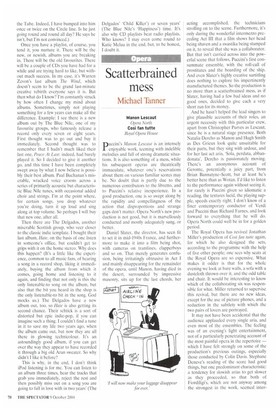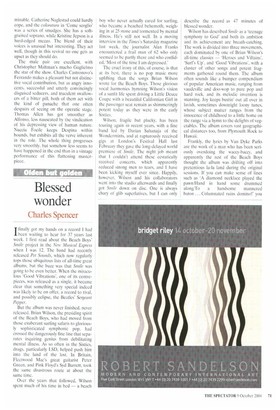Scatterbrained mess
Michael Tanner
Manon Lescaut Opera North Cosi fan tutte Royal Opera House
puccini's Manon Lescaut is an intensely enjoyable work, teeming with indelible melodies and full of strong dramatic situations. It is also something of a mess, while his subsequent operas are theatrically immaculate, whatever one's reservations about them on various familiar scores may be. No doubt that is partly due to the numerous contributors to the libretto, and to Puccini's relative inexperience. In a good production, one is so swept along by the rapidity and compellingness of the action that disproportions and strange gaps don't matter. Opera North's new production is not good, but it is marvellously conducted and mostly adequately sung, or better.
Daniel Slater, the director, has seen fit to set it in mid-1940s France, and furthermore to make it into a film being shot, with cameras on tramlines, clapperhoys and so on. That merely generates confusion, being irritatingly obtrusive in Act I and mainly disappearing for the remainder of the opera, until Manon, having died in the desert, surrounded by impressive masonry, sits up for the last chords, her acting accomplished, the technicians strolling on to the scene. Furthermore, it's only during the wonderful intermezzo preceding Act HI that a film shows her head being shaven and a swastika being stamped on it, to reveal that she was a collaborator. But that isn't carried across into the powerful scene that follows, Puccini's first consummate ensemble, with the roll-call of prostitutes and the boarding of the ship. And even Slater's highly creative surtitling does nothing to explore his impertinently manufactured themes. So the production is no more than a scatterbrained mess, as if Slater, having had a few bad ideas and no good ones, decided to give each a very short run for its money.
And he hasn't helped the lead singers to give plausible accounts of their roles, an urgent necessity with this particular crew, apart from Christopher Purves as Lescaut, since he is a natural stage presence. Both Natalia Dercho as Manon and Hugh Smith as Des Grieux look quite unsuitable for their parts, but they sing with ardour, and for her last act aria, 'Sala, perduta, abbandonata', Dercho is passionately moving. There's an anonymous account of Geronte, potentially a juicy part, from Brian Bannatyne–Scott, but at least he's better here than as Wotan. I'd like to listen to the performance again without seeing it, for rarely is Puccini given so idiomatic a reading, the textures lucid, the playing supple, speeds exactly right. I don't know of a finer contemporary conductor of Verdi and Puccini than Richard Fames, and look forward to everything that he will do. Opera North could well be in for a golden period.
The Royal Opera has revived Jonathan Miller's production of Cosi fan tuite again, for which he also designed the sets, according to the programme with the help of five other people; one sees why seats at the Royal Opera are so expensive. What makes it odder is that for the whole evening we look at bare walls, a sofa with a dustcloth thrown over it, and the odd table and chair. It would be interesting to know which of the collaborating six was responsible for what. Miller returned to supervise this revival, but there are no new ideas, except for the use of picture phones, and a reduction in the subtlety with which the two pairs of lovers are portrayed.
It may not have been accidental that the audience applauded every single aria, and even most of the ensembles. The feeling was of an evening's light entertainment, not of a particularly penetrating account of the most painful opera in the repertoire — which I have felt strongly on some of the production's previous outings, especially those conducted by Colin Davis. Stephane Deneve's reading of the score had good things, but one predominant characteristic: a tendency for Amish arias to get slower as they proceeded, so that both of Fiordiligi's, which are not anyway among the strongest in the work, seemed inter
minable. Catherine Naglestad could hardly cope, and the coloratura in 'Come scoglio' was a series of smudges. She has a softgrained soprano, while Kristine Jepson is a hard-edged mezzo. The blend of their voices is unusual but interesting. They act well, though in this revival no one gets as upset as they should do.
The male pair are excellent, with Christopher Mailman's macho Guglielmo the star of the show. Charles Castronovo's Ferrando makes a pleasant but not distinctive vocal contribution, but as angry innocents, successful and utterly convincingly disguised seducers, and truculent swallowers of a bitter pill, both of them act with the kind of panache that one often despairs of seeing on the operatic stage. Thomas Allen has got smoother as Alfonso, less nauseated by the vindication of his depressing view of human nature. Nut:6a Focile keeps Despina within bounds, but exhibits all the verve inherent in the role. The whole thing progresses very smoothly, but somehow less seems to have happened in the end than in a vintage performance of this flattening masterpiece.



















































































































 Previous page
Previous page